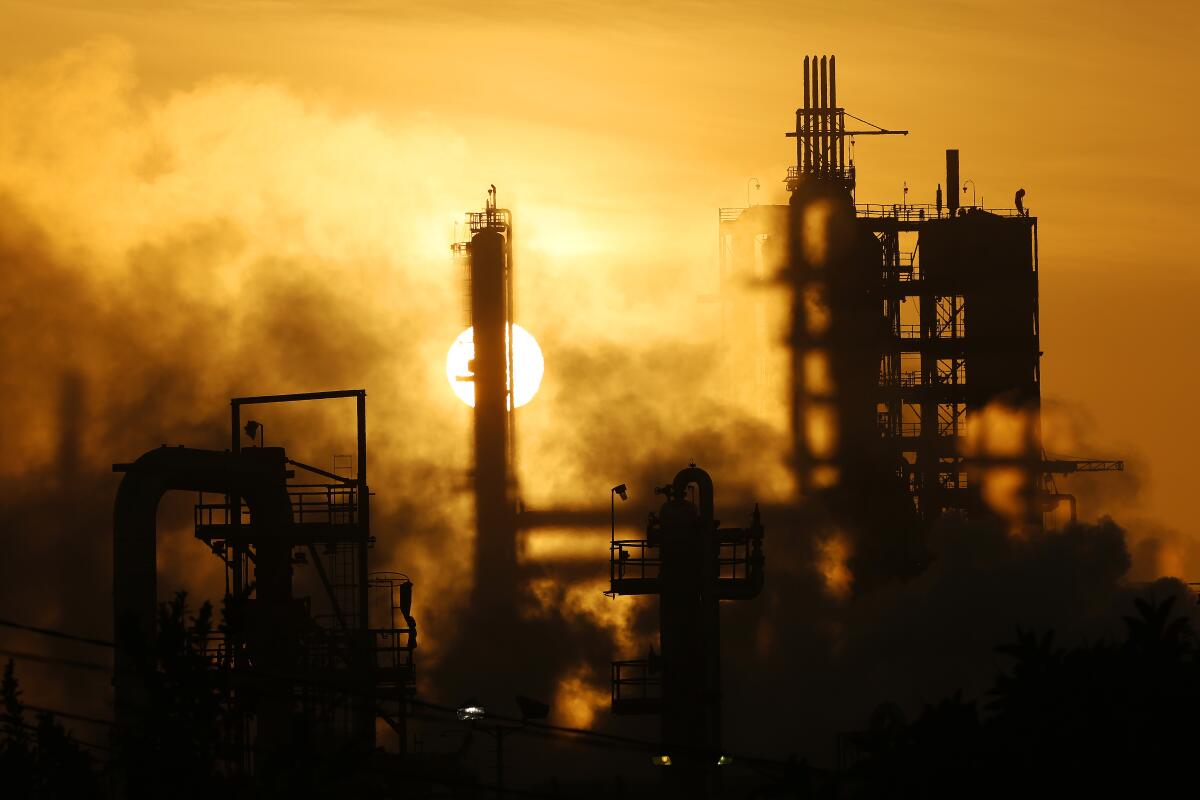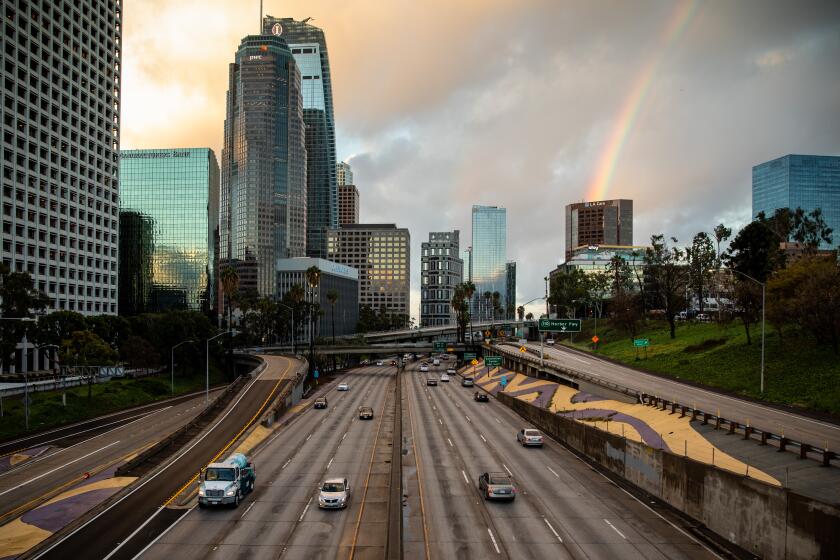Coronavirus is stalling air quality, pollution rules, even in eco-minded California

- Share via
As experts warn that exposure to pollution can increase the risk of dying from COVID-19, an array of powerful industries is pressuring California regulators to delay or roll back air quality and climate regulations due to the coronavirus outbreak.
The trucking industry wants to stall new emissions-reduction rules. Oil companies want looser enforcement of existing regulations. Port and shipping interests are pushing to delay rules on ocean vessels as they become Southern California’s largest source of smog-forming pollution.
Will Barrett, clean air advocacy director for the American Lung Assn. in California, said the lobbying effort is a “brazen attempt to use the COVID pandemic as a justification for long-held policy complaints about clean air programs in California” and accused industry of using the crisis “as cover to roll back or delay programs that will save lives.”
The breadth of requests presents a conundrum for regulators who, even in eco-minded California, have been open about the need to grant some measure of relief from environmental requirements in response to the pandemic. While officials say their commitment to fighting climate change and air pollution remains unshaken, they are nonetheless postponing compliance deadlines and delaying pollution-reduction rules.
To minimize the effects on air quality and climate goals, officials said they are considering such requests on a case-by-case basis and trying to separate those specifically related to the coronavirus from those seeking to capitalize on the crisis for long-sought regulatory relief.

Environmental factors including deforestation, air pollution and urbanization contribute to the severity of pandemics like COVID-19. Experts warn that if we continue to destroy the environment, future pandemics could become more common.
Kate Gordon, Gov. Gavin Newsom’s senior advisor on climate, said that some of the requests “are very understandable and really have to do with the fact of the current crisis, and in some cases they’re regulations that had already been a kind of a thorn in the side to certain industries and they just are using ... the moment to try to dispute them.”
Gordon said there was no blanket answer as to where the administration would draw the line. “There’s a million regulations and they all have to be looked at individually,” she said, adding “we’re emphatic that we’re not rolling everything back. We’re not taking advantage of this moment.”
Officials at the California Air Resources Board said they are forging ahead in crafting regulations to cut pollution from trucks, ships and other vehicles that generate the bulk of the state’s emissions. While field inspections have been temporarily halted, some meetings canceled or postponed and public comment deadlines extended, officials said they have not pushed back their timeline for adopting new regulations due to COVID-19.
“The only thing slowing CARB down at this point is that we have people working from home and that’s less efficient,” Air Resources Board chair Mary Nichols said.
It’s another story in Southern California, where records show regulators tasked with cleaning the nation’s smoggiest region have delayed consideration of more than 10 new or updated rules, citing COVID-19.
The proposed rules being postponed by the South Coast Air Quality Management District target powerful and heavily polluting industries, including oil refineries, warehouse logistics centers and metal-finishing operations.
Officials for the South Coast district said delays in adopting rules aren’t unusual, and were commonplace even before the pandemic. They acknowledged COVID-19 had pushed back timelines for adopting some rules by a few months, but blamed those delays largely on stay-at-home orders, telecommuting, and other coronavirus-related restrictions, rather than industry pressure.
“We’re still trying to move as hard and as fast as we can,” South Coast AQMD Executive Officer Wayne Nastri said.
Toward a more sustainable California
Get Boiling Point, our newsletter exploring climate change, energy and the environment, and become part of the conversation — and the solution.
You may occasionally receive promotional content from the Los Angeles Times.
Environmental groups and some elected officials are urging air quality regulators to stay the course, especially while the state confronts a virus that poses a heightened risk to people with the same underlying health problems, such as asthma and heart disease, that are worsened by breathing dirty air.
State Assemblywoman Eloise Reyes (D-San Bernardino) and dozens of other state legislators wrote Newsom on April 27 raising concerns that regulated industries “are using this public health emergency as an attempt to stop, delay, or otherwise weaken California’s environmental and public health protections.” They urged the administration to “resist efforts to roll back any current protections” and “move forward on critical rulemakings.”
Community groups fear regulators will bend to industry demands and further delay long-planned rules targeting ports, warehouses and other pollution hot spots where nearby residents complain they are paying for inaction with their health.
“People are in a very vulnerable place job-wise, health-wise, and it’s incredible that this is another thing they have to add to their list,” said Andrea Vidaurre, policy analyst at the Riverside County-based Center for Community Action and Environmental Justice. “We need the government to step in and hold the line.”
The requests for relief from current and future regulations have streamed in from entities big and small across the state, from transportation firms, metal shops and rendering plants struggling to make payroll to the powerful oil and shipping industries.
“Protect our members from unintended, unanticipated, and otherwise unavoidable state penalties and fines as ocean carriers provide the essential services necessary to keep the international supply chain up and running during this emergency,” Pacific Merchant Shipping Assn. President John McLaurin wrote in a March 30 letter to Newsom.
“All bus companies are just dead at this time and with CARB pushing enforcement of regulations, we cannot recover,” Pat Burriel of Fresno-based JSS Tours wrote in an April 2 email seeking a three-year rule suspension. “We’re struggling to pay our bills.”
As an indication of how it’s responding, the Air Resources Board provided documents showing “examples of the kinds of regulatory flexibility CARB is considering based on specific industry requests,” including extended reporting deadlines and “emergency event” designations.
At least one state lawmaker called on officials to go further.
State Assembly Transportation Chairman Jim Frazier (D-Fairfield) urged the Air Resources Board in a March 27 letter to “suspend the development and implementation of all proposed regulations” until 2021, and “examine the need to delay existing milestones in adopted regulations as we grapple with the long-term recovery of the COVID-19 crisis.”
Coronavirus: L.A. clean air miracle has already come to an end. Here’s why
William A. Burke, who chairs the South Coast air district’s governing board, said some of the loudest calls to slow down regulations came from the metal-finishing industry, which produces a lot of parts for the aerospace industry.
“I think that the district should be sensitive to both the environmental side and the business side of any rule that goes forward at any time,” Burke said. “But this is the most unusual circumstance of anyone who’s alive’s lifetime. So I think we take it on a case-by-case by basis.”
Air district staff said they held regular phone calls with metal-finishing industry representatives who begged for more time as they dealt with layoffs, travel restrictions and other challenges related to the pandemic.
“They just don’t have the bandwidth,” said Susan Nakamura, an assistant deputy executive officer at the South Coast district. “They’re struggling just to survive right now. Make payroll. Keep their business running.”
The air district ultimately postponed its consideration of planned rules to reduce the industry’s toxic air pollution.
Jerry Desmond, with the Metal Finishing Assn. of Southern California, expressed appreciation to South Coast air board members at a May 1 public meeting. Metal-finishing facilities have seen a 30% to 40% reduction in their operations, he said, and are “really embroiled in compliance with COVID-19 safe practices at the moment.”
California’s approach still stands in sharp contrast with the Trump administration, which has moved forward with environmental rollbacks during the health crisis and has suspended enforcement of a broad array of health and environmental protections in response to the pandemic.
Nichols, of the Air Resources Board, said the push to get rid of regulations is something that happens every time there’s an economic downturn, including the financial crisis more than a decade ago, “when we faced some of the same knee-jerk requests to suspend or roll back environmental regulations that we are today.”
Richard Frank, a professor of environmental practice at UC Davis School of Law, said he doesn’t expect significant erosion to California’s environmental protections because they have such broad public support.
“The commitment to environmental values in California is pretty deeply baked into the state’s social fabric and political DNA,” Frank said. “And I hope that’s not too naive a perspective. I don’t think it is.”
More to Read
Sign up for Essential California
The most important California stories and recommendations in your inbox every morning.
You may occasionally receive promotional content from the Los Angeles Times.












